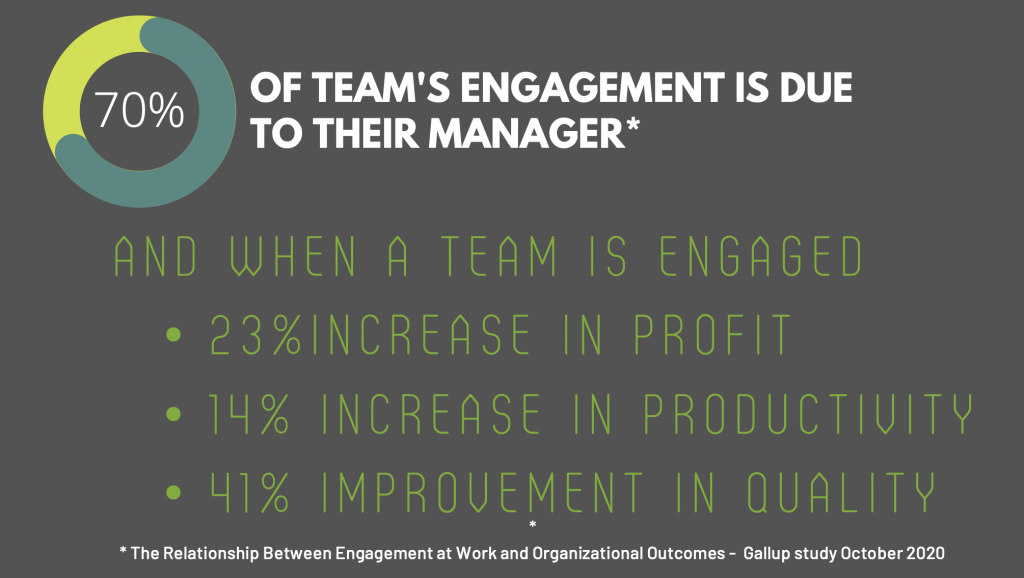The next logical step: leading people.

Becoming a great manager is a challenge for many, but the key to mastering it is all about your mindset and your willingness to let go of what you think you know.
You have been successful all your career so far: you graduated from high school and got into the post-secondary program you wanted. Next, you worked hard in that program and graduated and landed your dream job. After a good number of years learning the ropes and having been recognized as a top performer and someone the company can really lean on for your area of expertise, you are ready for the next step.
So you ask, “What’s next?”. Maybe you’ve never given any serious thought to management. Or you looked at your boss and thought, “That’s easy, I could do that”. Either way, managing people who do what you do seems like a very logical next step in your career.
The challenge with career advancement in most organizations is that there is typically only one path to more money, status, and responsibility, and that’s through management. But what most organizations fail to do is prepare people for the most important parts of being a great leader. I believe all companies need to provide a meaningful growth path for technical experts and top performers that doesn’t include managing people (because they are two very different jobs), but that’s a topic for another post.
There’s a lot of mediocrity out there

Managing people looks easy, right? Sit in an office all day, telling people what to do, sitting in meetings. And so many of your bosses don’t even do a good job that you’re sure you can do it better.
The ugly truth is that 50% of first-time managers fail in the first year, and only 39% actually get any training to be a manager. Gallup has studied engagement and productivity and shows that 70% of employees’ engagement is directly attributed to their direct bosses’ actions with them. And only 36% of the US workforce is actually engaged in their jobs. I don’t need to do the math to show you that there are a lot of crappy front-line managers.
Most first-time managers and companies fail to realize a simple and obvious fact. Managing is an entirely different job than what you came from.
Managing is an entirely different job
I’m sure that you believe this statement to be true, but I have seen countless numbers of people step into the ranks of management and try as hard as possible to continue doing what they have been doing as top performers in their function. They try to control every aspect of what their new charges do, they want to know, see, and understand everything about their team’s activity, and they get easily frustrated with how impossible it is to achieve that.
On top of that, if you are promoted from within the ranks, you likely are now in charge of what was previously your peers. You have preconceived ideas of what they’re capable of, and also who likes you and who doesn’t. It happens so often that new managers immediately favor their friends and coworkers whom they like, and ignore the “problem people”. This is one of the biggest reasons for failure early on.
Anyone looking to become a great manager and leader needs to accept the fact that 80-90% of their new job is nothing they’ve ever done before. Don’t believe me? Here is a list of a typical leader’s day-to-day responsibilities; how does it match to what the individual contributor does in your team?
Typical front-line manager responsibilities
- Setting the overall direction for a team
- Creating a vision that’s aligned with the company and is also inspirational to the team members
- Budgeting and tracking expenses
- Allocating work to individuals
- Coaching & mentoring
- Reporting upwards and coordinating with other teams
- Hiring new employees
- Communicating company news, directives, and changes in a constructive and concise way
- Giving trust to employees so they feel valued and allowing for mistakes and learning
- Measuring performance and providing feedback (successes and failures)
- Being accountable for all results and being responsible to recover any gaps
- Managing an ethical, diverse, and inclusive team
- Managing quality and ensuring skills are appropriate for all team members
- Supporting career development and growth of team members
In all of that, around 10% of your time will be spent using the technical knowledge that you have accumulated to date. If you spend more time diving into those details, then you are ignoring all of these responsibilities above and undermining your team members’ abilities to do the job themselves. It is ego, fun, and hubris that drives managers into a loop of micromanaging that they tell themselves is necessary for success.
If you still aren’t convinced that it’s a brand new job, read on.
Start with “What would I want?”
The best way to evaluate if you understand what it means to move to a manager-level position, ask yourself what kind of boss would be your perfect manager. What you look for in a perfect manager are the exact same things others would want from you as their boss.
Studies show that the same set of skills and actions make people love their boss, namely:
- Empowers their people but never micro-manages
- Be a good coach (ask lots of questions, be a guide)
- Be an open and authentic communicator
- Results-focused
- Be an exceptional listener (meaning you stop to really hear what they are telling you and empathize with them)
- Cares personally about the people for whom they lead
- Creates, communicates, and maintains a sense of shared purpose with the team and the company
- Prioritizes career development for the team.
Does this sound like the kind of boss you would like? Do you see anything there about your skill at performing the job or doing it yourself? What strikes me in this list is how much of people’s preferences center around authentically listening and speaking with the team.
Accept that you know nothing

First, the good news. No one expects a new manager to walk into the job and know everything there is to do it right. You have room to make mistakes, ask questions and grow. The best advice is to let go of any notion you may have about needing to have all the answers as a boss. No one is expected to know everything about every subject but somehow many of us get into our heads that by getting a new job we need to immediately have all the answers. People are promoted for their potential to become that role, not because they’ve learned everything before taking the job.
The bad news? You need to learn a completely different skill set to be a great manager. Go into the job assuming you don’t know the answers. You will be better in the long run if you have an open mind and seek as many resources as possible to help you learn the list of skills above. If you are looking for specific training on all the skills you need, contact me. Platypus Solutions has a comprehensive program for first-time or middle managers with all of the practical skills and mindsets needed.
You have a new product, and it’s not what you think
The biggest struggle most new managers have is letting go of their previous attachment to contributing directly to the product. The reality is that in your new role you no longer are building, drawing, designing, buying, or otherwise adding direct value. Your team does that. So what’s the product of a leader? Look at the typical roles above and think about what they all have in common. The product of a manager is talking and listing, otherwise known as communicating. Whether it’s emails, calls, one-on-ones, presentations, videos, notes, high fives, or a beer after work, your only deliverable is to help others deliver.
Your only product is to help others deliver.
Give up on your need to go back to what you were so good at. Let your team do that now. I know it’s sad to let that part of you go, but you have a new job now. Go and learn it with an open mind.


